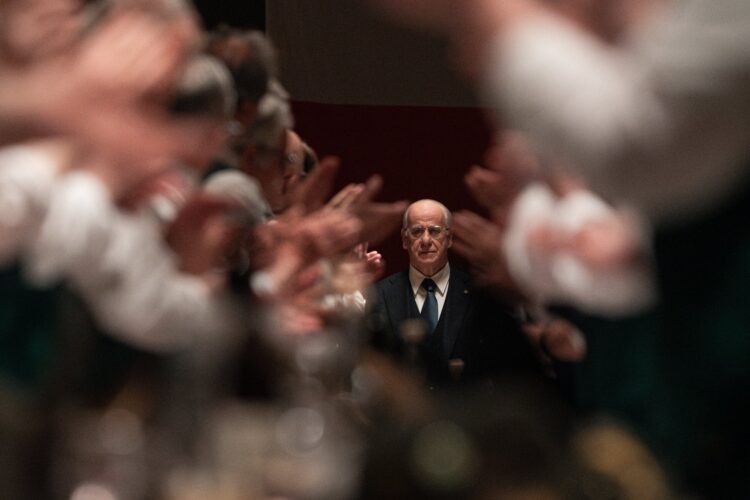
In something of a rare feat, all three of the most prominent European film festivals chose the works of homegrown talents to kick off their latest edition. Earlier this year, German director Tom Tykwer opened Berlinale with The Light; French debutant Amélie Bonnin’s Leave One Day did the same for Cannes; now the 82nd Venice Film Festival gets underway with La Grazia, the latest by arguably the 21st century’s most-celebrated Italian director, Paolo Sorrentino. It’s decidedly better than the other two fest-openers, probing some profound questions about life and death that are accompanied by Sorrentino’s trademark visual flair. While the resolution doesn’t live up to what’s promised by the premise––compromised, as is often the case, by a note of over-sentimentalism in the filmmaker’s work––fans of The Great Beauty will likely enjoy this artfully rendered, contemplative, if not truly incisive drama.
The film, whose plot was kept secret up until its premiere, revolves around Mariano De Santis (Toni Servillo), the aged president of Italy six months away from the end of his term. Being a former judge, De Santis is reserved, thoughtful, and obsessed with the idea of truth. Finding himself in the final stretch of his career and life, Mariano turns increasingly introspective and reminisces about the love he shared with deceased wife Aurora. Along with this reverie, a suspicion is rekindled that Aurora had an affair 40 years ago. While the fact that he doesn’t know who his dead wife’s ex-lover is eats at De Santis, he’s also faced with the decision of whether to sign a bill allowing euthanasia into law and grant pardon to two people convicted of killing their spouses. Throughout the two-hour-plus film, we see the old man navigate his duties, personal convictions, and private turmoil in an attempt to find peace at last.
With style, focus, and a dash of humor, La Grazia starts very strong. Following an arresting opening sequence which simply reprints the Italian president’s (many) constitutional powers against an electro-fueled, wonderfully counterintuitive sonic backdrop, we’re thrown into the statesman’s daily routines that range from receiving foreign heads-of-state to having dinners with friends who still tell it like it is. These scenes depict, quite vividly, a rarified life to which few of us would ever have access. More importantly, they build a compelling central character that, despite their extraordinary circumstances, feels real and vulnerable. As required by his office, De Santis must follow protocol and decorum for doing just about everything. At the same time, he also needs old pals like the eccentric, loud-mouthed Coco (a scene-stealing Milvia Marigliano) to call BS on the politics and civility that surround him. From the outside, he seems like the epitome of poise and dignity, yet there’s much unrest bubbling right beneath the surface. You feel drawn to someone like that––someone with doubts and insecurities like the rest of us, but whose job requires life-and-death calls.
La Grazia‘s second half, which deals with the character’s decision on the euthanasia bill and two pardon requests, is less successful. When he admits to having trouble signing the bill, his daughter retorts with a philosophically, ethically loaded question: “Who owns our days?” Sorrentino proves once again that his ambition to tackle big themes isn’t always backed by the means to unpack them properly. In this case, the event that finally helps the conscientious protagonist make up his mind is way too simplistically conceived in relation to the dilemma it purports to solve. The same goes for the pardon cases: while their outcomes may vary, neither is treated with the nuance or intellectual rigor they deserve. Besides an overflow of emotions, not much is on display to justify grand concluding remarks from De Santis, such as “grace is the beauty of doubt.” It all just feels too easy.
Narrative shortcomings notwithstanding, La Grazia is never a chore to sit through. Lensed by Daria D’Antonio, it boasts lush, lyrical images that hug your eyeballs like a blanket. The use of music is also very effective, by turns electrifying in the unexpected beat drops and quietly soothing thanks to a melancholic main theme. On a technical level, Sorrentino has no trouble staging striking spectacles. Something as simple as the Portuguese president’s walk down the red carpet is shot and scored with operatic fury that also gives viewers some peek into the mindset of the host waiting on the other end. Servillo, in his seventh collaboration with Sorrentino, carries the film with his magnetic presence. Compared to Jep Gambardella, his character in The Great Beauty, Mariano De Santis is no less larger-than-life but marked by a mode of restraint. With a performance that often communicates through stillness, he commands your attention all the same and creates an emotional through-line for viewers. Servillo is a joy even as Sorrentino’s script runs short of ideas worthy of his craft.
It’s fair to say that, with La Grazia, Sorrentino managed to rein in his penchant for the spectacular over the meaningful, seen most notably in his last feature Parthenope. The style-substance ratio here is still not ideal, but the film offers enough of both for an appealing, intellectually, and emotionally tickling experience.
La Grazia premiered at the 2025 Venice Film Festival and will be released by MUBI.
The post Venice Review: La Grazia Finds Paolo Sorrentino Struggling to Match Toni Servillo’s Talents first appeared on The Film Stage.
from The Film Stage https://ift.tt/oslDQan


0 Comments